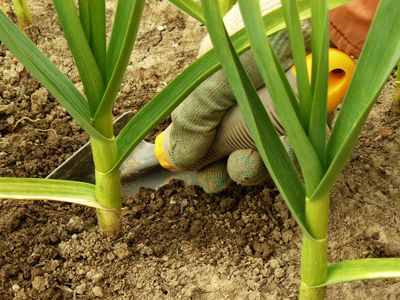What is a Chamiskuri Garlic?
Garlic lovers have many different varieties from which to choose. A quick glance at Chamiskuri garlic info indicates it was collected in 1983 and is classed as an “artichoke” variety. It produces shoots earlier than many other softneck cultivars and has a nice mild flavor. This is an easy variety to grow provided you have the right soil, site, and planting time. Artichoke varieties of garlic often develop purplish streaks on the bulb skins. Chamiskuri has creamy white papers on the cloves, which are small and bunched closely. This variety does not produce a scape and, therefore, no hard stem at the center of the bulb. It produces in mid-season and can be easily braided for curing and storage. The garlic can store for many months in a cool, dry location once cured. The flavor is pungent but not sharp, with a milder garlic flavor than hardneck varieties. Since it stores for a long time, many gardeners also grow the shorter lived hardneck varieties, so they have garlic year-round.
Growing Chamiskuri Garlic
All garlic plants need well-draining soil. Plant from bulbs for earlier yields or use seed (which can take several years until harvest). Plant seed in early fall and bulbs in spring. Plants prefer full sun but can tolerate light shade. Incorporate well-rotted compost to the garden bed. In areas prone to late freezes or boggy soil, install bulbs in raised beds to prevent rotting. Mulch around the plants to keep weeds at bay and conserve moisture. Keep soil moderately moist but never soggy. Chamiskuri garlic plants will get 12 to 18 inches (31-46 cm.) tall and should be spaced 6 to 9 inches (15-23 cm.) apart.
Caring for Chamiskuri Garlic
Like most garlic varieties, Chamiskuri needs little special care. It is resistant to deer and rabbits and few insect pests bother it. Occasionally cutworms will eat small sprouts. Side dress new plants with bone meal or chicken manure. Feed plants again as bulbs begin to swell, usually May to June. Keep weeds out of the bed, as garlic does not do well with competing vegetation. Check bulbs in late June by digging around the plant. If they are the size you require, gently dig them out. Brush off the soil and either braid several together or hang them individually to dry. Remove tops and roots and store in a cool, dry location.
